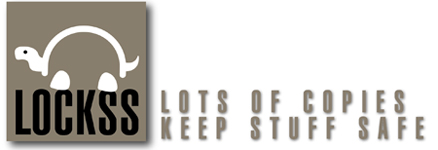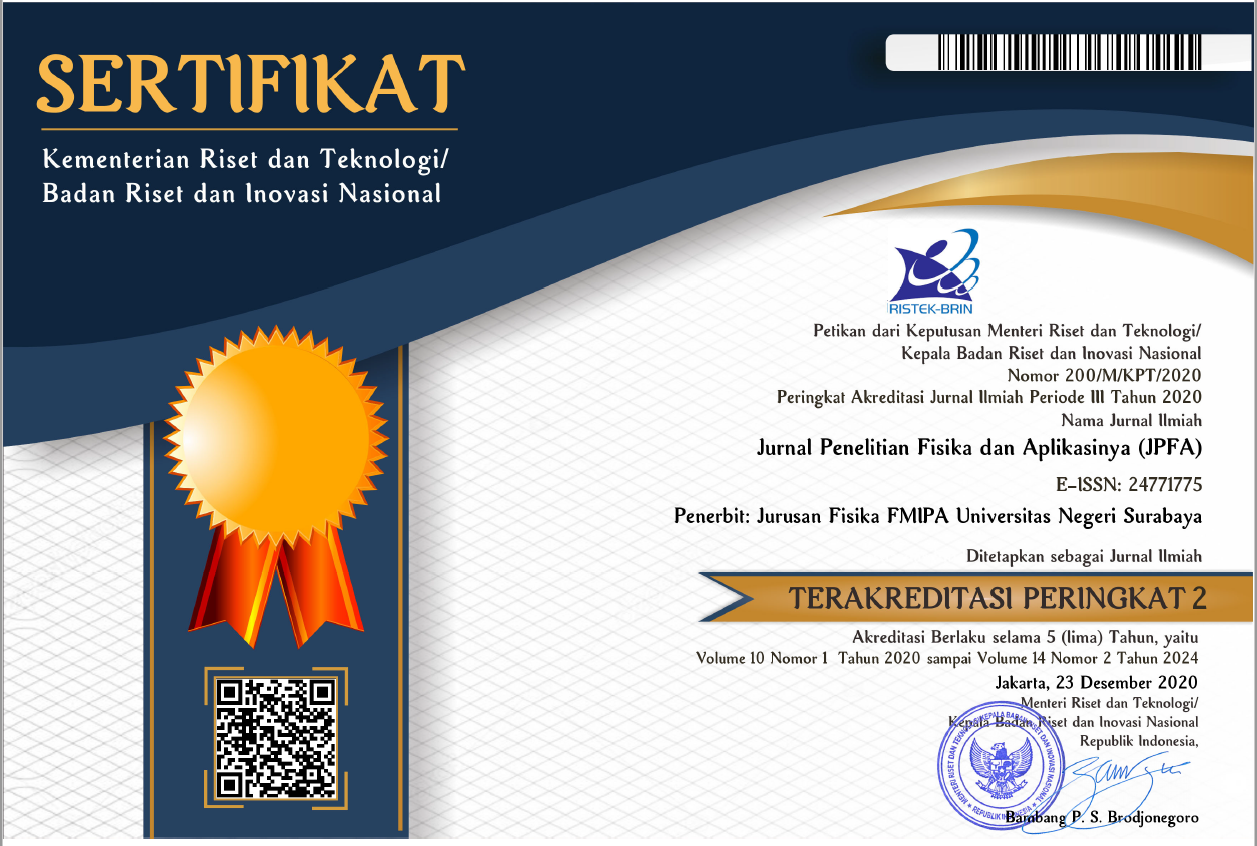JOURNAL POLICIES Focus and Scope Editorial Policies Peer Review Policies Publication EthicsManuscript Template
OTHER INFORMATION Abstracting and Indexing Citation AnalysisInformation and FAQ
Publication Frequency
Jurnal Penelitian Fisika dan Aplikasinya (JPFA) - Journal of Physics Research and Its Application - is a peer-reviewed journal that is managed by Department of Physics, Faculty of Mathematics and Natural Sciences, Universitas Negeri Surabaya and published by Universitas Negeri Surabaya or the State University of Surabaya in collaboration with Perkumpulan Pendidik IPA Indonesia (PPII) or Indonesian Society for Science Educators and Physical Society Indonesia (PSI). JPFA is published periodically (twice a year) in June and December, in which 8-10 articles will be published in each issue.
Open Access Policy
This journal provides immediate open access to its content on the principle that making research freely available to the public supports a greater global exchange of knowledge. All articles published on JPFA are open access by following the Creative Commons: Attribution-NonCommercial 4.0 International license. Full license can be found here.
Anti-plagiarism Policy
All articles submitted to JPFA must be the original work of the author (free of plagiarism). The submitted article has never existed in any media and/or is not being or will be submitted in any media. The author is responsible for the authenticity of the submitted manuscript. All incoming manuscript will be checked for authenticity to prevent plagiarism by using Turnitin and/or iThenticate, anti-plagiarism software. Any forms of high-level plagiarism will be banned (temporary up to permanent banned).
Article in Press
Articles in Press on JPFA are articles that have been accepted for publication in JPFA but have not yet been assigned to specific issues (volume and number). Articles in Press can also be the articles that have been assigned to specific issues but the issue has not been published yet. They provide possible chance to read about the latest developments in a certain research area before articles are officially published.
There are three types of Articles in Press on JPFA:
Articles in Press that include errors, or are discovered to be accidental duplicates of other published article(s), or are determined to violate JPFA publishing ethics guidelines in the view of the editors (such as multiple submission, bogus claims of authorship, plagiarism, fraudulent use of data or the like), may be “Withdrawn” from JPFA. Withdrawn means that the article content (HTML and PDF) is removed and replaced with a HTML page and PDF simply stating that the article has been withdrawn according to the JPFA Policy on Article in Press Withdrawal with a link to the current policy document. Articles that are "withdrawn" in Articles in Press will not be published in JPFA.
Internal Policy
Editors, Peer-reviewers, and Proofreaders of JPFA are permitted to submit an article in this journal with the following conditions:
Journal Scientific Statement
The articles published in Jurnal Penelitian Fisika dan Aplikasinya (JPFA) are scientifically proved the following the ethics code of scientific publication. The ethics code itself upholds three values of ethics in publications, namely, (1) Neutrality (free from conflicts of interest in the management of publications); (2) Justice (giving the right of authorship to the beneficiary as the author); and (3) Honesty (free from duplication, fabrication, falsification and plagiarism) in the publication. The articles published also follow the certain procedures or orders, such as double blind review and revision process that consistent with the journal’s regular review, to ensure that the quality is maintained properly.
Reference Management Software
All articles submitted to Jurnal Penelitian Fisika dan Aplikasinya (JPFA) should use the reference management software (e.g., Mendeley, EndNote, and Zotero) with Elsevier Vancouver citation style.
The JPFA citation style in Mendeley can be downloaded from the following link:https://csl.mendeley.com/styles/12229861/JPFA-Citation-Style. More information about the installation of JPFA Citation Style in Mendeley can be seen in the JPFA Author Pack. The JPFA Citation Style in other reference management software will be coming soon.
Archiving
JPFA is deposited in multiple digital archives to guarantee long-term digital preservation. These archives include:
2. Garuda (Garda Rujukan Digital)

This journal also utilizes the LOCKSS system to create a distributed archiving system among participating libraries and permits those libraries to create permanent archives of the journal for purposes of preservation and restoration. More...
JPFA's Documents
JPFA is Nationally Accredited by Kemdiktisaintek RI (Ministry of Higher Education, Science, and Technology of the Republic of Indonesia). The journal is classified into national's 2nd highest cluster for reputable journal in Indonesia (Sinta 2).
Period: 2023-2027 (Recent)
No SK: 177/E/KPT/2024
From: Vol 13 No 1 2023
Until: Vol 17 No 2 2027
Sinta grade: Sinta 2
Announcement: Arjuna Website
Certificate (2020-2024):
The current certificate is still awaiting issuance from Arjuna.
PREVIOUS ACCREDITATION
Period: 2020-2024 (Sinta 2)
No SK: 200/M/KPT/2020
From: Vol 10 No 1 2020
Until: Vol 14 No 2 2024
Certificate: pdf
Period: 2016-2020 (Sinta 2)
No SK: 21/E/KPT/2018
From: Vol 6 No 1 2016
Until: Vol 10 No 2 2020
Certificate: pdf